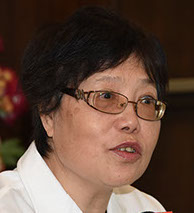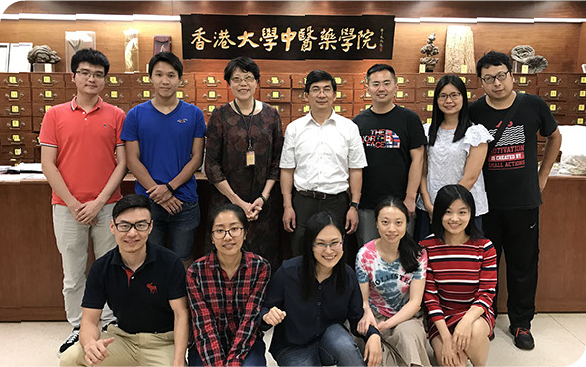
A research team in the School of Chinese Medicine (SCM) has developed a medicinal dietetic soup which helps ameliorate the side effects of chemotherapy including reduced white blood cells, alopecia, fatigue and discolouration of the skin and nails.
“We are still doing clinical trials,” said team leader Dr Chen Jianping, Associate Professor of the SCM, “but mid-term results of the research show that the soup pack may ameliorate chemotherapy side effects, thereby not only improving the patients’ quality of life but also potentially reducing the chances of not completing the chemotherapy treatment.”
At the same time, the soup does not change the efficacy of the chemotherapy. Indeed, animal tests suggest it may enhance the effects of the chemotherapy drugs, and even help reduce the tumour. The team has tested it on two types of chemotherapy – Taxanes, such as Paclitaxel and Docetaxel, and Anthrocyclines, such as Doxorubicine.
The dietetic soup has taken more than three years to develop and combines a mixture of Dr Chen’s knowledge and clinical experience in traditional Chinese medicine (TCM). The idea came about as a result of discussions she was having at her TCM clinic with patients suffering from breast cancer. “Advances in cancer diagnosis and treatment mean that the survival rate of cancer patients has been increasing, yet the side effects of chemotherapy can still be acute and affect the quality of life of patients. They told me about the pain and distress they were in because of the side effects of chemotherapy, so I started looking for a way to help,” said Dr Chen.
At first she was planning a TCM-based remedy, but realised that doctors of Western medicine tend to disapprove. Instead the research team developed the soup pack based on the theory of ‘homology of medicine and food’ combining prescriptions from ancient texts with laboratory experiments and clinical trials.
Said Jessie You, Dr Chen’s PhD student who is doing the clinical trials: “The ingredients are not ordinary foods, they are what we term ‘function foods’. It is a mixture of processed medicinal food, including black soya bean, coarse cereals and phycomycetes. Black soya bean is known in TCM for its efficacy in cleaning out toxins – it contains anthocyanin, flavonoids and procyanide [PCS] which may help detoxification – and for its antioxidant properties.”
Black soya bean is also renowned for protecting normal cells. “Further, it helps with hair growth, and the hair grows back more black in colour,” added Dr Chen. “This may seem insignificant but it is not, as this kind of thing makes the patients feel better about themselves and therefore more likely to be positive and stick to chemotherapy.”
The clinical trials began in 2015, with the team recruiting patients of any kind of cancer who were either receiving chemotherapy or had completed chemotherapy for no more than two weeks. More than 200 cancer patients were recruited, assigned to the soup pack group or control group, and required to take the soup for at least six weeks.
Dr Chen said: “Mid-term results of the 100 participants who completed the clinical trial indicate that the soup could prevent and ameliorate the side effects of chemotherapy; that it significantly increases the rate of hair growth, improves nail and skin discoloration, reduces fatigue as well as white blood cells induced by chemotherapy. Basic experiments also showed that the soup did not affect the efficacy of chemotherapy drugs, but that it could strengthen the inhibitory effect of doxorubicin on cancer cells and demonstrated a protective effect on normal liver and kidney cells.”

![]() Some doctors of Western medicine are reluctant to try Traditional Chinese Medicine – I hope that when they see the advantages it brings to patients’ health and well-being, this soup will help to change their minds.
Some doctors of Western medicine are reluctant to try Traditional Chinese Medicine – I hope that when they see the advantages it brings to patients’ health and well-being, this soup will help to change their minds. ![]()
Dr Chen Jianping
Souped Up
Dietetic soup aims to relieve side effects of chemotherapy and to open new eyes to the benefits of traditional Chinese medicine.
Next
Back
Dr Chen Jianping (third from left in the back row) and her research team in the School of Chinese Medicine.
Dr Chen Jianping (front), Associate Professor of the School of Chinese Medicine, Li Ka Shing Faculty of Medicine, with her researchers and patients.
Developed based on the theory of ‘homology of medicine and food’, all ingredients of the soup pack are
processed medicinal food, including black soya bean, coarse cereals and phycomycetes. It is suitable for
everyone as it is neutral.
Tea variety
In addition to soup packs, the team has also produced it in teabag form. It has a pleasant taste, and is easy to drink every day. “Appetite loss can be a problem for patients,” said Ms You, “but even if they have difficulty eating simple foods such as rice and vegetables, they can at least drink our tea or soup.”
They have now applied for a patent and want to move to the next stage of developing more products and making them available to public. It is not expensive to produce so it will be within many people’s price range.
“Crucially, both TCM and modern Western medicine agree on the qualities of black soya bean,“ concluded Dr Chen, who is hoping that an important outcome of this research will be to open up more medical practitioners to the possibilities of TCM. “Some doctors of Western medicine are reluctant to try TCM – I hope that when they see the advantages it brings to patients’ health and well-being, this soup will help change their minds.




